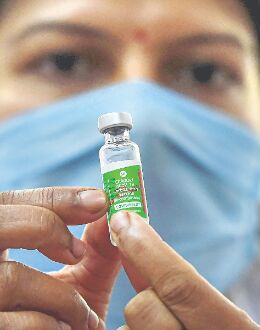Mamata writes to PM Modi seeking more Covid vaccines

Kolkata: Chief Minister Mamata Banerjee wrote to Prime Minister Narendra Modi on Thursday raising her concern over the inadequate and irregular supply of vaccines to Bengal at a time when it has emerged as a topper among other states in terms of inoculation drive with minimum wastage.
Banerjee also stated in her two-page letter that the state has received only 25 lakh doses of vaccines in the month of July when the Health ministry claimed that it had sent 75 lakh jabs.
"Unfortunately, only 25 lakh doses have arrived so far this month. Hence, we would earnestly request you to kindly give necessary instructions so that supply in our state is increased and a substantial portion of the population is vaccinated before the third wave sets in," she wrote.
"The Prime Minister has stated during a programme in Uttar Pradesh that the state is best in inoculation drive. But Bengal did the best in this connection with minimum wastage. It is minus 6 percent in Bengal. Some states are getting vaccines in excess while others are being deprived. I have no objection if UP is given more. But why should Bengal get deprived of getting vaccines to financial issues related to devolution funds and GST compensation? It is unethical that just because of a BJP-run state, it will get more vaccines," Banerjee said while addressing a Press conference at Nabanna.
She also stated in her letter to the Prime Minister that as per the state's assessment, there is a need for around 11.5 crore more doses of Covid vaccine to cover everyone in the eligible categories and going by the current level of supply, it may take rather a longer period before everyone is covered.
In this connection, she maintained: "They should give at least 1.5 crore to 2 crore to Bengal every month. Even if we get that number, then also it would take six months to ensure vaccination for all."
Stating that at present 3 lakh doses are getting administered every day, she further said the state has the capacity to vaccinate 10 lakh people in a day. But it can be done only if the Centre provides adequate doses. She also stated about the problems being faced by private hospitals in carrying out inoculation drives as vaccines are not being supplied in sufficient quantities.
She also wrote to the Prime Minister in this connection and stated: "Currently, we are administering around 3 lakh doses of vaccine every day in our state and it is becoming very difficult to maintain this level due to irregular supply. We have a capacity that we can vaccinate more than 10 lakh people every day provided sufficient quantity of vaccine is made available."
Banerjee further wrote: "Bengal government is giving topmost priority to Covid vaccination to ensure the maximum coverage with minimum wastage. The state has started vaccination from January 16 and till date has already administered 2.5 crore doses (with 1.81 crore of first doses and 0.70 crore as second doses)." This comes when the Centre has provided only 2.12 crore doses while the state directly purchased 18 lakh vaccines.
"As per the information received from the Ministry of Health and Family Welfare Government of India state has been allocated 73 lakh doses of Covid-19 for the month of July. But unfortunately, only 25 lakh doses have been received till date in the current month," the letter further read.
Soon after returning to power, Banerjee had written to Modi on May 5 requesting to ensure free-of-cost Covid vaccine for all in the country besides introducing a transparent policy for distribution of vaccine and oxygen to the states. She had also accused the Centre of sending only 1.5 lakh vaccines then to Bengal when it had sought three crore doses.
Again on May 20, she wrote to the Prime Minister urging him to arrange vaccines for state and Central government employees, engaged in priority sectors, for which still there is a need for at least 20 lakh doses.
With her relentless efforts, the state government has become successful in bringing down the Covid positivity rate to 1.5 percent that was 33 percent during the eight-phase election. The discharge rate has also gone up to 98 percent on Thursday.



